Peter MALONE
Saturday, 18 September 2021 19:25
Stone Years, The/ Petrina Chroniou

THE STONE YEARS (PETRINA CHRONIOU)
Greece, 1985, 142 minutes, Colour.
Directed by Pantelis Voulgaris.
The Stone Years of the title refer to 1954 to 1974 and focuses on membership of the Communist Party and its illegal status. It focuses on the aftermath of the Greek Civil War, the attempts of the Left to gain power, the assassination of Lambrakis (the basis for the film Z) in 1963, the coup of the Generals and the overthrow of the Generals in 1974. The film is episodic and epic. However, rather than focusing on the broad history and panorama of Greece during these years, it focuses on two characters and traces their hardships at the time. The film moves rapidly from one period to the other with subtitles - an effect that makes the film less accessible to a universal audience, not familiar with the details and feelings of this period of history.
The film has a long running time, is often very slow, relying on close detail to communicate the characters and their moods. However, the film is well-acted in a plaintive way that elicits audience sympathy.
As with so many films dealing with the period, the film highlights the arrogance of the Centre and Right-wing governments against the Left - and makes judgments in retrospect about civil rights and repression.
1. An interesting film? For Greek audiences? For world-wide audiences? Audience knowledge of the period?
2. The title and its ironies, the focus on the characters and their imprisonment? Illegal status? Repression and persecution? The contrast with the post-'74 period and the hopes for democracy in Greece?
3. The re-creation of periods: the 1950s, the '60s, the 1970s - sets and decor, costumes? The details of life at the time (music, cinema)? The passing of the years? The episodic nature of the film? The use of close-ups, the slow pace of the film and the sudden bursts of action? The musical score and its moods?
4. The film's comment on Greek history: the impact of World War Two, the civil war, the Communist Party and the lost of the war, the illegal status of the Communist Party? The role of the police, the military? The various movements for democracy? The riots and protests? The coup of the Generals? Prisons and the treatment of political prisoners?
5. The film as a portrait of Eleni: in the town, her hopes of being a doctor, her love for Babis and the lyrical sequence by the river? The trip to Athens and the encounter with the actress? Her hopes? her illegal status? The frustration of her hopes? the passing of the years and her being on the run? Separated from family? Searching for Babis? The various contacts within the party, the various rendezvous points? Police chases and her eluding the police?. The reunion with her aunt? The glimpses of Babis - on the boat and her waving at him? His release? The encounter and her pregnancy? Her arrest? The imprisonment, life in prison, the birth of the child and the other women prisoners helping? The encounters with Babis across the courtyard? The decision about the judge? The happiness of the wedding? The son exchanging the crowns during the ceremony? The change of government, her taking her own time to leave the prison? The final reunion with Babis and her son after twenty gears? The portrait of a woman's courage, political convictions, the experience of her family, the exile of her mother, her aunt? A woman of courage?
6. Babis and the opening, his love for Eleni, the arrest and the torture, his imprisonment, not being heard of, being glimpsed on the boat, the release, a stranger to Eleni yet loving her, the reunion, the child, his looking for the child in the park, his arrest, communicating with Eleni across the courtyard, the marriage, the happiness, reunited with Eleni?
7. The background of families, parents and grandparents exiled, the sequence with Eleni’s aunt? The people in the town? Partisans? Police? The law, the warders - and the sympathetic wardress for Eleni? The prison officials? The fellow-prisoners?
8. The prison sequences and their effectiveness? Eliciting audience sympathy for the characters?
9. Themes of Left and Right, political convictions, legality and illegality of parties?
10. A film of human values? The basic human values transcending persecution and suffering?
Published in Movie Reviews
Published in
Movie Reviews
Tagged under
Saturday, 18 September 2021 19:25
Stone Boy
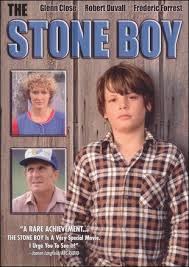
STONE BOY
US, 1984, 91 minutes, Colour.
Glenn Close, Robert Duval, Frederic Forrest, Jason Presson, Wilford Brimley, Dean Cain.
Directed by Christopher Cain.
Stone Boy is a low-key film about two brothers. One accidentally kills his brother with a shotgun -and we look at the effect that this accident has on him, in his own understanding of himself, as he feels that he is judged by his parents, family and friends.
The film is set in the folksy American West, has an atmosphere of Americana. The parents are portrayed by Robert Duvall and Glenn Close with Frederic Forrest as an uncle. The film was directed by Christopher Cain (Grand Jury, The Principal).
While the film might be too leisurely for many audiences, it focuses on a significant theme - a young boy trying to cope with a tragedy that would daunt an adult and trying to find his place in his family.
1. The film as a piece of Americana? Universal appeal? Portrait of family, grief, hope?
2. The American West, the folksy families and towns? Authentic locations? Musical score?
3. The title and its relationship to Arnold? His experience, his reaction, recovery?
4. The focus on the family: Gene and Arnold, early in the morning, getting up, going out to work, the games, the relationship between the two, the accident? Arnold's reaction and going to pick the peas, rather than telling what had opened? The consequences?
5. The portrait of Arnold: his becoming hard and the stone boy, a 12-year-old, his relationship with his brother, grief, parents and their lack of response, disturbance in the night, his relationship with his grandfather talking, staying with him? The experience of the funeral? The interrogation by the police - and suspicion of malicious circumstances and motives? The boy's loneliness, his relationship with his uncle? His uncle's problems? Going away, travelling? Finding Lou and talking with her? The conversation with the mother and the baby on the bus home - the instincts of the mother, his feeling free to talk, to weep? His return, telling the story, reconciliation?
6. His good parents, the detail of their characters, relationship, trying to cope with the tragedy, details of home life, the incident itself, the funeral, grief? The family coming together? Their failing to respond, well to Arnold? Their dealing with the mother's brother and Lou, his new girlfriend? Grandfather? The daughter and her trying to c6#e with the grief?
7. The portrait of the uncle - his grief, his nephew's girlfriend, the beginning of the affair, his attitude towards his wife and child, their fighting, drifting, angers? Lou and the clash, Lou and the divorce, talking with Arnold? The girlfriend at the bar? The women and men in this kind of society?
8. The portrait of the grandfather, his relationship with the various members of the family, his wisdom, his love for Arnold, hearing him, understanding, bringing him into his home, allowing him freedom, hoping that he would
grieve?
9. The sketch of the woman on the bus, the baby, her friendliness towards Arnold, listening to him? Enabling him to weep?
10. Themes of family accidents, grief, love and hate? The impact for American audiences? Worldwide?
Published in Movie Reviews
Published in
Movie Reviews
Tagged under
Saturday, 18 September 2021 19:25
Stolen Life, A
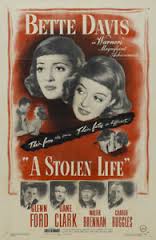
A STOLEN LIFE
US, 1946, 107 minutes, Black and white.
Bette Davis, Glenn Ford, Dane Clark, Walter Brennan, Charles Ruggles, Bruce Bennett. Peggy Knudsen, Esther Dale.
Directed by Curtis Bernhardt.
A Stolen Life is a melodramatic Bette Davis vehicle from the mid-'40s. It was made after her successful period, dramatically and at the box office with a string of hits from 1939 to 1945. This film was made by her own production company. She took the opportunity to play twins (which she was also to do in Dead Ringer in 1964). There is a pleasant Bette Davis as will as a bitchy Bette Davis. She plays them both to the hilt. Her leading man is Glenn Ford - perhaps a bit too relaxed as a pipe-smoking scientist. Dane Clark, on the other hand, is a temperamental artist. There is a good supporting cast including Walter Brennan and Charlie Ruggles. Direction is by Curtis Bernhardt who was to direct her in Payment on Demand. Bernhardt was working at Warner Bros. at this time making their dramas and melodramas (e.g. Devotion, the story of the Bronte Sisters). The film receives the lush Warner Bros. style and is an enjoyable melodrama of its kind.
1. The popularity of Bette Davis? The film as a Bette Davis vehicle? Mid-'40s? The touch of film noir?
2. Warner Bros. production values: affluence, the world of society, the blend of the real and the artificial? Soap opera and melodrama? The lush musical score?
3. The popularity of melodrama? Contrived and heightened characters and situations? Audiences enjoying the dramatic intensity? The credibility of such stories? Bette Davis as a heroine of this kind of melodrama?
4. The use of Bette Davis in the twin roles: appearance, look, manner of speaking, similarities and contrasts? Two Bette Davises for the price of one! The editing and photography work, even Bette Davis lighting a cigarette for her alter ego?
5. Kate as pleasant, her arrival at the island, shyness, boat, the encounter with Bill, her falling in love with him? Friendship with the lighthouse-keeper? Her reaction to Pat and her intruding? Bill falling out of love with her? Her being angry but suppressing it? Pat's luring B111? The marriage and its effect? Pat's return from South America? The clashes between the two sisters? The accident, Pat's taunts, her death? Kate assuming the identity? The credibility of this decision? her regaining her health? Trying to be Pat? The tension in trying to be the bitchy sister? The audience sensing this tension in Bette Davis' performance? Re-meeting Bill? The discovery of the affairs? Divorce? The background of the artist and his help? Her walking out, unable to sustain the deception? her reliance on her uncle - his continued support? Bill's return, the discovery of the truth? The happy ending? The effect of her stolen life?
6. The contrast between Kate and Pat? Pat and her arrogance, social life, her vigorous entry, wilful behaviour, dancing with Bill, playing with his emotions? The marriage? Motivation? South America, affairs, return? The irony of the affair and Kate having to learn about it and try to act up to it? Her death?
7. Bill: pleasant man, scientist, falling for Kate, attracted to Pat, caught in her wiles, the marriage, neglect, Brazil, the return, the effect of her death, the separation? His response to Kate as Pat? Difficulties9 the truth and the happy ending?
8. The lighthouse-keeper and his friendliness, help in the accident? The uncle and his continued support?
9. The artist and his relationship to Kate, support from her, his eccentric manner?
10. Pat and the affair with the businessman? His reacting to Kate as if she were Pat?
11. Popular themes of love, hate, tension, cruelty, deceptions? This kind of soap opera as heightened fable about perennial values?
Published in Movie Reviews
Published in
Movie Reviews
Tagged under
Saturday, 18 September 2021 19:25
Stitches
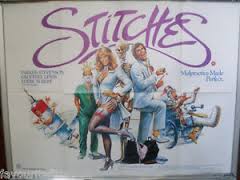
STITCHES
US, 9185, 89 minutes, Colour.
Parker Stevenson, Eddie Albert, Geoffrey Lewis.
Directed by Alan Smithee (Rod Holcomb).
Stitches is a raucous comedy set in a hospital. While it has all, the ingredients of the television soap opera, it opts for the Police Academy method and style. Needless to say. the emphasis for humour is on sex jokes. The central characters are smug and less than sympathetic. Parker Stevenson (who has appeared in better films and television series), seems at home in the central role of the hero.
There is a range of medical students, all involved in hoaxes, and pranks (beginning with posing as cadavers in the autopsy room and racing naked down corridors ... And the humour continues in that vein). At times there is the human touch as the questions of their relationship to the girls is given a slightly more serious tone. There is a sub-plot about grants for universities, the comeuppance of smug authorities. There is also, of course the glamorous student who compromises the hero in the eyes of the heroine and there is a Chinese, exchange student who gets into all kinds of nonsensical mix-ups. It in something of a surprise to see Eddie Albert as the money-hungry Dean of the university hospital.
The director is Alan Smithee, the pseudonym given, for films where there has been troubles with the actual director who withdrew his name from the completed film.
Another example of the spate of teenage, sex comedies that abounded in the early '80s.
Published in Movie Reviews
Published in
Movie Reviews
Tagged under
Saturday, 18 September 2021 19:25
Stepford Children, The
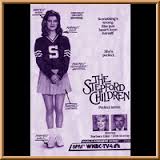
THE STEPFORD CHILDREN
US, 1987, 96 minutes, Colour.
Arthur Hill, Don Johnson, Sharon Gless, Richard Anderson, Don Murray, Barbara Eden, Tammy Lauren, James Coco, James Staley, Pat Corley, Randall Batinkoff, John Cameron Mitchell.
Directed by Alan J. Levi.
The Stepford Children is the third in a series which began with the film version of Ira Levin's The Stepford Wives, written by William Goldman and directed by Bryan Forbes. There was a telemovie, The Revenge of the Stepford Wives, which virtually repeated the plot of the original. In the sequel, Arthur Hill, from the original, gets his comeuppance, especially at the hands of Sharon Gless. Don Johnson is her self-centred husband.
The third film repeats the plot of the original but transfers it to the children of Stepford. Once again there is the men's club with its old-fashioned American attitudes. There are the subservient doll-like wives who are robots. There are the high school kids who are transformed into clones of '50s attitudes.
Don Murray is the husband who wants his family to return to Stepford. Richard Anderson takes the Arthur Hill part as the sinister presider over Stepford and its transforming the women and children into robots. Barbara Eden is the heroine who confronts the Stepford men.
The basic idea was an interesting and exciting one in terms of science fiction - and it is transferred quite well here to the children.
1. The interest in The Stepford Wives? The sequels and their value? From the 1970s to the '80s?
2. The basic plot, '80s and the repetition of the plot and the application to the children?
3. The town of Stepford and its style? American apple pie town? The men's club, The glamorous and subservient women, the old-fashioned high school? Children? Special effects? musical score?
4. The husband, a widower, the truth about his life in Stepford, and the death of his wife, his decision to take the family to Stepford? The planning, the arrival, the meeting of friends, the clash with his children, his wife's career? The fights in the house, the pressure on him to transform the family? The accidents and his reaction? The visits to the men's club? His daughter and the transformation? The attack on his wife? His final destruction?
5. The wife, busy, career, legal skills, the decision to go, her love for her husband, her children? The arrival in Stepford and her suspicions, the encounter with the people, setting up her practice? Her friend and the vigour of the jogging, the conversation? her reaction to the change? Preparing the kids for school? Their reactions? The confrontation of her husband? The accident? Her decision to investigate? The finale and the explosions, the escape?
5. The son and daughter and their style, New York, going to Stepford, school and, fashions, the old style response, the son and his girlfriend and her vigour, the visit to the house, outings? Suspicion?
6. The build-up to the escape, the accident, seeing her as a robot, in hospital? The daughter and her relationship with her father, being taken out, taken to the finale in the laboratory? The escape?
7. The men, their philosophy of life, their sense of order, the American way, controlling? Turning humans into robots?
8. The children of Stepford, at school, clothes, manners, way of speaking, the dance, the rock and roll and its upsetting them? The cliches? The recording and the repetition of phrases?
9. The effect of the changes on the various children? On the wives of Stepford?
10. The build-up to the confrontation, the men, the pursuit, the laboratory exploding?
11. Contemporary science fiction and fantasy? Contemporary themes about the quality of life?
Published in Movie Reviews
Published in
Movie Reviews
Tagged under
Saturday, 18 September 2021 19:25
Stepfather, The
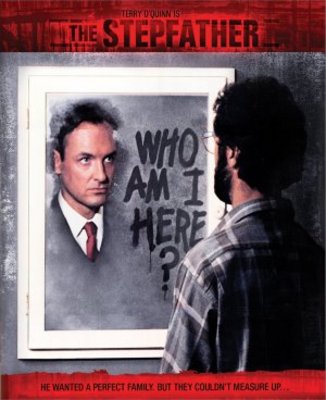
THE STEPFATHER
US, 1987, 89 minutes, Colour.
Terry Quinn, Shelley Hack. Jill Schoelen.
Directed by Joseph Ruben.
The Stepfather received great acclaim as an excellent thriller. Made on a small budget with a no-name cast (with Shelley Hack in a guest role as Susan), the film, nevertheless, won acclaim from critics and the public.
The film was written by Donald Eastlake, noted for his crime thrillers such as Point Blank, The Hot Rock. It was directed by Joseph Ruben who made the antinuclear imaginative thriller, Dreamscape. Terry O'Quinn is excellent as the manic stepfather.
The film works on Hitchcock suspense, is not explicitly violent until the ending. There are acknowledgements to Hitchcock in brief glimpses eg, of The Birds, of Psycho. However, the basic screenplay is reminiscent of Hitchcock's version of Thornton Wilder's Shadow of a Doubt where a respectable looking citizen is really a murderer. In fact, the stepfather of this film has the ideal of the American family and breaks out and mass-murders when it does not live up to his ideals. In this way the screenplay is quite ironic and makes comment on the public face of America, the American Dream, television situation comedies and commercials - and the underlying violence in the American psyche.
An interesting and thoughtful thriller.
1. The acclaim of the film? Its cult status? How well does it work as a thriller?
2. The atmosphere of the American city, suburbia, clean suburbs and homes and families? The contrast with the underside of the violent American psyche? The special effects and stunts? Pace? The musical score and the
importance of mood?
3. The title and its focus on Jerry, the family? Jerry's place in the family? His past and its unravelling? The initial glimpse of the slaughter? His marrying, not wanting to break up the family, his mouthing of the ideals, his disappointment and rage, his execution of the families, his moving to new families?
4. The title and its reference to Stephanie, her viewpoint on her stepfather, the audience sharing her viewpoint and knowing more than Stephanie? The contrast with Susan's lack of knowledge and awareness of the truth?
5. The film as a piece of Americana: apple pie surface and puritanic underside? The joviality of Reagan's America of the '80s? The importance of religion, grace at meals? The wholesome television, Jerry watching Mr Ed? Celebrations, picnics, Thanksgiving feast days? The magazines and the building of the bird-house? Jerry looking for ideal locations for each home and family? The film working ironically on several levels?
6. The focus on Jerry, the bearded Manson look-alike, his changing his appearance, dapper dressing, whistling 'The Camptown Races' as his theme? Leaving the house unconcerned about the mass slaughter - the touch of horror and audience reaction? The boy delivering the paper at beginning and end of the film? One year later, his pleasant manner, the excellence of his disguise, his involvement in American Eagle? Real Estate? The range of clients, friendly, neighbours, in love with Susan? His relationship with Stephanie and her innate horror of him, being repelled, keeping her distance? His mouthing his ideals, smiling, buying the dog for Stephanie, the celebration with his clients? The irony of the information in the paper about reopening the case? Stephanie seeing his manic outburst in the basement? The bird-house and its building? The tools? The interaction with Stephanie, concern about his refusal to go to see the psychologist? His killing the psychologist, his shrewdness in unmasking him, the elaborate taking of the body and destroying it? His breaking the news to Stephanie, reunited with her? The possibility of a smooth household? Stephanie's date, kissing at the doorstep and his eruption? Letting his job go, smooth-talking Susan about his behaviour? His changing the photo for Stephanie's inquiry? His planning his next involvement? The violent killing of Ogilvie after the recognition? His being irritable with Susan, the pursuit of Stephanie, the violent confrontation, his death? The plausibility of his character? The author's comment about the fresh-faced and seeming reliable mass-murderers?
7. Stephanie: 16, her absent father, her relationship with her mother, anti-Jerry? The situations, the dog? Her girlfriend, the talk, suspicions, writing away for the photo? Her disappointment when she received it? Her erratic behaviour at school, expulsion, Jerry pleading for her? The various therapy sessions, her relationship with the therapist? The impact of his death? The reconciliation with Jerry? Her date, the kissing, the reaction? Jerry pursuing her throughout the house? Her final chopping up the bird-house?
8. Susan as the nice American wife, her love for Jerry, love for her daughter, trying to make the peace? The surprise at his absence from his job, Jerry's attack on her, her finally shooting him?
9. The sketch of the doctor, the therapy, help and understanding, decision to meet Jerry, his lack of preparation in making his case, slipping up on being shown through the house, his death?
10. The newspaper, Ogilvie and his concern, the new article? His desperate pursuit of Jerry, the discovery of the magazine, checking it out in the library, interviewing the various people, his arrival and his death (as Martin Balsam's in Psycho)?
11. The neighbours, pleasant, the irony of the couple breaking up? Teachers at school? The police and the impossibility of leads?
12. The American television style of the film, the American way of life, Mr Ed? The irony of the smooth surface and the malevolence and violence underneath? What was the audience left with in terms of drama, character, understanding the psychology of the killer, the American society which produces this killer?
Published in Movie Reviews
Published in
Movie Reviews
Tagged under
Saturday, 18 September 2021 19:25
Steaming
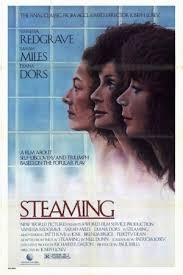
STEAMING
UK, 1985, 102 minutes, Colour.
Vanessa Redgrave, Diana Dors, Sarah Miles.
Directed by Joseph Losey.
Steaming is the screen version of Nell Dunn's very popular play. Nell Dunn was the author of Poor Cow, a popular film of the 60s with Carol White.
The film keeps the action to the baths in London where a group of women, representing a cross-section of London society, meet weekly to bathe, take the steam as well as talk and share their lives. This gives the opportunity for a great deal of comment about British society, the role of men and women, the aspirations of women. The film presents everything from the sensibility of women. The screenplay has been adapted by Joseph Losey's wife Patricia. Joseph Losey (The Boy with Green Hair and other films in the United States before being blacklisted, The Sleeping Tiger and other film-s in England before his emergence as a major director with The Servant, King and Country, Accident, his working in England and France during the 70s, including such films as Don Giovanni: this was his last film as director.
The cast is very good indeed, led by Vanessa Redgrave. It was also Diana Dors’ last film.
The film rearranges scenes from the play - and audiences who had admired the play were not pleased with the film.
They felt that it lost its direct impact, lost a great deal of its humour. However, as a film it has a lot to offer in terms of raising consciousness about women's issues.
1. A play into film? The success and reputation of the play? Adaptation for the screen? The remaining within the baths location? The speeches? interactions?
2. The baths as a location: interiors, the style of the building and arches, areas and their uses, the steps, the rooms, the pool? The baths as a significant place? The editing of the film, pace, action, close-ups and profiles, speeches? the musical score, the instrumental work, mood?
3. The British focus of the film? London and London women? Manner, style, interests, accents, variety of classes, careers and opportunities? A significant cross-section of women?
4. Steaming as a women's film: women's sensibilities, experiences, outlooks, lives, careers, potential and possibilities? The women in themselves, their styles, interests, emotions, relationships? Sexuality? Freedom, sharing, being natural with one another, the variety of moods, the frankness and nudity of the baths? Relationship with men, attitude towards men, being moulded by them, victimised? Talking about them? Dependent and independent? Husbands? Lawyers? Maintenance? the film as an example of woman talk, women's issues, anger, speaking out?
5. The portrait of Vi - in the place, her work? Diana Dors and her past image? Her final film? Her attachment to the place, working for 18 years? The tender phone calls to her husband? Josie's initial intrusion and her patient listening, care, advice? A friendly woman? Seeing her at work, her involvement in the issues, the closing down of the baths, her sadness, the co-operation of the women, their working together? The celebration of success?
6. Josie and the initial intrusion, her emotionalism, erratic behaviour, outburst, her experience, the lover at home, the violence? Her need for excitement and reaction against boredom? Vi’s listening and advice? Her later visits and the progress of her relationships? Reconciliation and yet being abused and hit? Her visits to the baths, Her motives, her ups and downs? Her reaction to each of the characters? Her feeling put-down, her outburst against Nancy and her view of life and attitudes, against Sarah? Her realising that she had been too angry? The truth spoken in anger? Her capacity for reconciliation and forgiveness? The closing down of the baths, her rising to the occasion, becoming involved, taking on the task of speaking out, the acclaim of the women, her rehearsal about her speeches, dressing herself up and making herself presentable? Her achievement in speaking? A victim yet an achiever?
7. Vanessa Redgrave as Nancy - her appearance, height, manner of speaking? Her background? Proper, limited experience? Her getting in touch with Sarah and going to the baths? Renewing friendship? A woman with a sense of decency, devotion to her husband, children? Her memories of her marriage? Her dependence? Helping her husband's career, friends being those of her husband? Her dependence? Her enjoying going to the baths, joking? Her modesty and not being nude? Her baring her life? Becoming attached to the baths? Exploring Sarah's life and their memories? Listening to Josie? Helping Dawn and her mother? Josie's outburst against her and the revelation of the limitedness of her life? Her interest in the campaign to save the baths, involvement? her changing? A new outlook, discussing this? Sharing the enjoyment of the achievement? Her entering the baths nude and its significance for her self-assertion and freedom?
8. Sarah as the successful career-woman, memories of school, the dizzy jet-set life, her memories of her husband and their relationship, his dominance, his abandoning her in Caracas? her marriage and its break-up? Her wanting to have children - and it being too late? Responding to Nancy’s invitation, enjoying her children? Her becoming a career-woman, and the story of the legal adviser saying that if she had been a man she would be a head of a corporation? Her study, hard work? Her freedom, friendship, Josie's attack and her response? Participation in the campaign, the money for legal consultations, her legal ingenuity and help? her freedom and exhilaration in the achievement and the celebration?
9. Dawn and her mother? The old woman as old-fashioned, ill, her home and its lack of comforts, conservative attitudes, socialising at the baths? Protective of her slow-witted daughter? illness, lying down? Gradual shifts because of the friendship of the women? Her not being caught up in the feminist stances - but in her heart sharing them? Dawn and her slowness, devotion to her mother, her continual comments about eating and meals, her modesty? Her being upset at the news shout the closing of the baths, her screams and tantrum? Involvement in the campaign, coming alive, painting herself, her nudity, the achievement - and her development?
10. Celia and her place in the baths, her work, the massage and cashing, her helping, listening to the women, her achievement, racial background, one with the women at the baths?
11. The glimpse of the clients, the steaming, the showers, the massage, their chit-chat?
12. The cause of the baths - as an institution, its social role, the fight for keeping it, the posters and the T-shirts, Josie's speech, the achievement and success? celebration?
13. A film of women's issues, the intentions? How persuasive? A focus on people, their humanity? Entertainment? learning experience?
Published in Movie Reviews
Published in
Movie Reviews
Tagged under
Saturday, 18 September 2021 19:25
State Secret
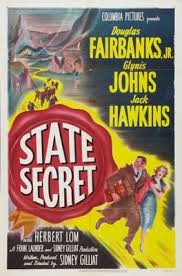
STATE SECRET
UK, 1950, 104 minutes, Black and white.
Douglas Fairbanks Jnr., Glynnis Johns, Herbert Lom, Jack Hawkins, Karel Stepanek, Walter Rilla, Sam Jaffe.
Directed by Sidney Gilliat.
State Secret is an enjoyable thriller from the team of Frank Launder and Sidney Gilliat (The Lady Vanishes). It is espionage in the Alfred Hitchcock, John Buchan vein. However, this is post-World War Two. The atmosphere of the Cold War and the Iron Curtain. The focus is on a totalitarian state and its threat to the free world.
The location photography in Europe is effective, especially in the car chases and the mountain-climbing. Douglas Fairbanks is a good debonair hero. Glynnis Johns is attractive as the heroine. Herbert Lom, as always is a villain.
1. An entertaining thriller? Light style? Serious undertones of the times?
2. Black and white photography, European locations, mountains, cities? Special effects? William Alwyn's score?
3. The 1950s and the attitudes towards central Europe, communist states, the cold war? Europe of the past as the holiday place for their affectionate memories? British? The film's comment on the central Europe as the place for espionage? Totalitarian takeovers?
4. Secret missions, danger, escapes, espionage? The flashback technique, - how effective? For suspense?
5 John Marlowe: American background, skills, working in England, the invitation, the situation in Vosnia, the reality about the President's health, the operation and the crisis? The pressure on Marlowe? Dangers, escape through the city, contacts with Lisa, with Theodore and the black market? With the Vosnian authorities? The scape, the journey, the cars, the mountains? Capture? The final rescue? A hero of thrillers?
6. Lisa and attractive, her life in Vosnia, English background, with Marlowe, sharing his escape, help? Romance?
7. Theodore and his black-market connections, blackmail, help, threat and menace?
9. The picture of the Vosnian authorities the military, leaders, the elections, propaganda, cover-ups?
9. Action and pace, car chases, mountain climbing?
10. The plausibility of this kind of adventure? In action and espionage stories?
Published in Movie Reviews
Published in
Movie Reviews
Tagged under
Saturday, 18 September 2021 19:25
Stand Up and Cheer
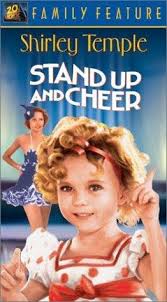
STAND UP AND CHEER
US, 1934, 80 minutes, Black and white.
Warner Baxter, Madge Evans, Nigel Bruce, Stepin Fetchit, Frank Melton, Lila Lee, Ralph Morgan, James Dunn, Shirley Temple, John Boles, George K. Arthur.
Directed by Hamilton McFadden?.
Stand Up and Cheer has to be seen to be believed. It is an optimistic film about the Depression. It indicates something of the mentality of authorities who wanted to improve popular morale - although indicating that there were selfish money interests not interested in ending the financial crisis.
The film is small-budget, though lavishly advertised, 20th Century Fox morale-boosting. It stars Oscar winner (In Old Arizona) Warner Baxter as an impresario, so skilful on Broadway and unearthing talent, that he is appointed by the President of the United States as Minister for Amusement. The film shows him setting up his ministry and finding talent so that the spirits of America could be cheered. Some politicians and some business interests try to undermine his work.
There is not much attempt at characterisation. Warner Baxter is earnest, Madge Evans as his Secretary for Children's Entertainment is naturally in love with him. There are a number of musical items - especially a long collage of people in ordinary occupations (both white and black) singing a 'Let's Smile' medley.
There are some routine musical numbers included, including work by John Boles. James Dunn does a song-and-dance routine (with rather largish chorus girls) for 'Baby Takes a Bow' - and Shirley Temple appears in one of her earliest roles (and influential in gaining her better roles) with 'Daddy Take a Bow'.
There are also some comic routines of groups popular at the time. The film was based on a homespun optimistic idea by Will Rogers. It ends with the end of the Depression being triumphantly announced and everybody happy.
Published in Movie Reviews
Published in
Movie Reviews
Tagged under
Saturday, 18 September 2021 19:25
Stand By Me
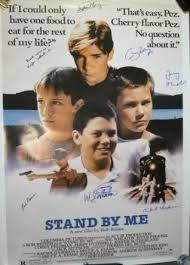
STAND BY ME
US, 1986, 89 minutes, Colour.
Richard Dreyfuss, Keifer Sutherland, River Phoenix, Jerry O’Connell?, Wil Wheaton, Corey Feldman, Casey Siemaszko.
Directed by Rob Reiner.
Stand By Me is based on a novella by Steven King, 'The Body'. It has been well adapted for the screen and focuses on the atmosphere of the late '50s, the State of Washington, young teenagers and the rite of passage to adulthood. The film has strong atmosphere, uses many songs of the period to give it background and mood, including the title song.
The cast is very good: Wil Wheaton portrays the sensitive young writer. River Phoenix (who went on to significant roles in such films as The Explorers, Little Nikita, Mosquito Coast), Cory Feldman (The Lost Boys, Licensed to Drive) and Jerry O'Connell as the fat boy, Vern. Kiefer Sutherland leads the older gang of the town. Richard Dreyfus appears at beginning and end as the older writer who reminisces and his voiceover continues throughout the film.
The film was directed by former actor (All in the Family) Rob Reiner whose film credits include The Sure Thing, This is Spinal Tap and The Princess Bride. The film is a fine evocation of its period and of young teenage boys.
1. An enjoyable film? Insightful? Its acclaim?
2. A film of memories, Steven King and his career? The period, rites-of-passage? American boys? A piece of Americana?
3. The use of Oregon locations, the countryside, the small town, the railway line, the river?
4. The musical score and the hits of the '50s and '60s? Their being played throughout the film? The theme of the title song, its mood and rhythms, lyrics, finale?
5. Steven King and his novella, autobiographical, insight into boys, insight into the author?
6. The older author at the opening of the film, the car, the news of Chris Chambers' death? Memories? Revisiting the past? The importance of the voiceover, the explanations, editorial comment?~ The author reappearing at the end, his word processor, his reflections on friendship and its possibilities? His summing up of what had happened to his
friends? The picture of his own sons?
7. The situation: boys of 13, the young gang, the strength of their friendship, games together, the tree house, their swagger, with swearing and smoking, the touches of dirty and vulgar talk, the behaviour of boys of that age, part of the rites of passage?
8. The contrast with the older gang: age, tough, rough, the bonds between them, pushing people round?
9. The Body situation: the death of the boy, his innocence, the audience discovering him with the teenagers? The pathos of his death and his dead body? The possibility of reward for finding the body? The motivation of the older group? The secret, the older boys telling, going, their being tough on the roads, playing chicken and threatening, the trucks? Their finally finding the body but thwarted by the young group?
10. Vern overhearing the information, going to tell his friends, their decision to go: the walking, forgetting to take the food, Chris with the gun and his scaring Cordie? Their messing around on the way as boys will be boys? The yard and their trespassing, the stories about the dog, its chasing Gordie and the reality of the dog? On the train line, Teddy and his wanting to play chicken, Chris dragging him off, the reconciliation and touching hands? On the bridge, the beauty and peace of the river, Vern dropping his comb? The coming of the train and the running across the bridge? The drama and the danger? Their feeling free in the forest, the bonds between them, sharing the food, camping, Gordie telling his story, being on guard and scared, going off the road, in the water, the fright of the leeches? The effect of the journey, the losing the sense of time?
11. Their talk along the journey, the background of their family, their hurts, tough, arguing and fighting, the bonds between them?
12. Gordie and the audience seeing his family, his father and his disdain of his younger son, praising the footballer son, Gordie hating his father? The nightmare in the forest and the resentment towards his father? His love for his brother, his brother supporting him, especially about the story? His father's comments? The absence of his mother's support? Going on the trip, the gun, fooling with Chris, the shots? His leadership in the group? Relationship with each of the friends? The dog and his running? Buying the food and the comments of the owner about his brother and the football? Running with Vern on the bridge? The night and the camping, his storytelling, his talking with Chris and Chris's weeping about his family and himself? The leeches? The confrontation with the older gang, his drawing the gun and threatening Ace? His decision about the body, their reverently covering it? The need to see the dead body, the effect on him? The effect of the whole experience on his later life and his friends knowing that he would write it down?
13. Chris and his family, his older brother and the gangs slinging off at the youngsters as girls? His being a thief and taking the money? His bitterness about his life, weeping with Gordie? Yet tough, the gun? His concern for Teddy on the railway lines? His leadership in the group? The final confrontation at the body site? His future? Skill as a lawyer? Intervening to break up a fight and being stabbed?
14. Teddy and his comic style, yet his bitterness? His admiration for his father in the army? His father being in the asylum? Tough, on the train line, being pulled off by Chris? The yard man and his abuse, Teddy's anger? His participation in the journey? His future and jobs?
15. Vern as the fat boy, overhearing the information, concerned about food, bringing along the comb? Lagging behind, on the bridge and his crawling, dropping the comb, having to run? Scatty in his listening to the story? Not wanting to go off the train line? His future - job, marriage and family?
16. The author' s comments on what happened to the boys? The experience of the journey, their returning and the town not being the same, their drifting apart? Not seeing Vern and Teddy much? Ten years from seeing Chris? Chris' death?
17. Themes of youth, special times, boys acting as boys, rites of passage, change? A picture of human nature?
Published in Movie Reviews
Published in
Movie Reviews
Tagged under